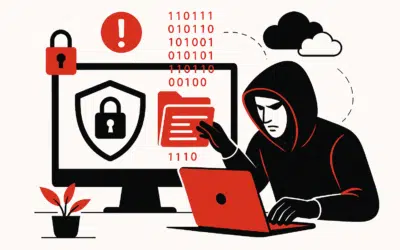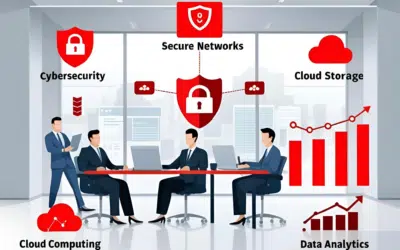Connect Remote Workers, Using VPN Security
Quick, name a business trying so hard to reduce its operational costs.
If that’s your company, would you let your workers use your network applications and data from outside the office?
Giving remote workers easy and secure access to your network with virtual private network (VPN) technology can result in big savings.
A VPN sets up a private Internet (IP) connection that uses encryption and authentication to protect the communications traversing it. Acting like private and exclusive tunnels from one place to another, VPNs extend your business to wherever it needs to go: home or satellite offices, shared workspaces, coffeehouses, or anywhere else your workers use their laptops, PCs, or IP phones. The right VPN solution just works.
Until now, most small and medium-sized businesses (SMBs) have been implementing VPNs for these two reasons:
1. Network security
VPNs meet the need to protect information assets, as well as to comply with privacy regulations.
[list style=”bullet”][li]”Network security is vital, even when a business doesn’t have to comply with specific security regulations,” says Randall Bennett, CEO of Secure Enterprise Computing, a Cisco Select Certified Partner. “We’ve seen the demand for security in the SMB market go up tenfold in the last two years.”[/li][li]”Our primary reason for going with Cisco VPN technology was security,” says Kevin Tucker, IT manager for Birdstep, a technology company with about 100 employees. “We also wanted voice over IP, the ability to connect to multiple ISPs, and flexibility in controlling our firewall.”[/li][/list]
2. Productivity
Letting employees remotely access company applications makes them more productive.
[list style=”bullet”][li]”It makes it much more efficient,” says IT Manager Shay Pickett of Brown Bear, a carwash/ convenience-store chain. Supervisory staff can connect via VPN to the office or any Brown Bear store from any location, increasing their management efficiency and reducing drive time.[/li][li]”If I can connect to the company’s resources at 7:30 a.m. instead of sitting in traffic burning fuel and ‘windshield time’, it’s an advantage for everybody and the environment,” says Bennett.[/li][li]”We had 18 inches of snow recently,” says Ryan Halper of Cynnex Networks, a Cisco Registered Partner. “Most people stayed home all week. And with our VPN, it was business as usual.”[/li][/list]
In today’s economy, there’s also a third reason to implement VPNs.
3. Lower costs
VPN technology can reduce your overhead costs for on-site employees; if you use contract workers, you can pare your labor costs too. For example:
[list style=”bullet”][li]Facility: Remote workers don’t require your office space, or the monthly utilities, parking, maintenance, and insurance expenses that go along with it. In the United States, office space alone ranges from $1.25 (Paso Robles, California) to $7.00 (midtown New York City) per square foot per month. VPNs let you downsize your facility to the minimum without reducing productivity or customer service.[/li][li]Equipment: You don’t need to provide remote workers with office furniture, either. Contract workers also have their own computers, as do most employees who do some work at home.[/li][li]Payroll: Using independent contractors relieves you of employee benefit costs, which averaged 42.7 percent of U.S. company payroll in 2007, reports CFO.com.[/li][/list]
What Does a VPN Solution Cost?
Halper says the cost to purchase and implement a VPN solution for remote workers depends several factors: the number of VPN users, the degree of redundancy (the backup technology), the type of connectivity (data, video, and/or voice services; software or always-on hardware solutions), and the network security hardware already in place. He says that many companies start with basic systems and then later upgrade to solutions that include redundancy and voice service.
Halper provides these rough cost examples, which cover the purchase and implementation of a basic Cisco data VPN solution:
[list style=”bullet”][li]For a company with a few dozen users and a Cisco Adaptive Security Appliance (ASA) already in place, the cost ranges from about $80 to $120 per user.[/li][li]For a company without such an appliance in place, the additional cost for a Cisco ASA 5505 would be about $1000 for 10 users.[/li][/list]
Now, how many of your employees and contractors could perform their work remotely? How much will this save your business in overhead expenses? A Cisco reseller partner can show you the VPN solutions that will take you there.








